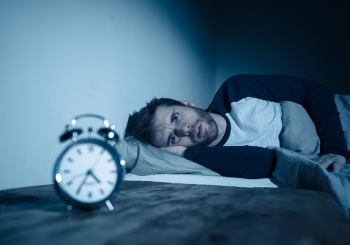
Having trouble sleeping is an incredibly common experience. If you have been having frequent and severe trouble sleeping, you might be experiencing insomnia. A clinical diagnosis of insomnia means that you experience at least one of the following symptoms three or more nights per week:
- Trouble getting to sleep
- Trouble staying asleep
- Waking up early and being unable to get back to sleep
If this describes you, you might ask yourself how long this has been the case. While it’s normal to have occasional trouble sleeping, especially during stressful times in our lives, sleep difficulties that last more than 3 months can indicate that it is time to get help. At this point, you might notice that some aspects of your life are beginning to suffer: you might feel tired during the day, feel irritable with your family, or dread going to bed. Sleep is incredibly important, and when our bodies don’t get it our capacity to function can be severely limited. Knowing this, you may have tried treating your insomnia by self-medicating with alcohol, marijuana, benadryl, or sleep-aids like Lunesta. While prescribed medication for sleep can be an incredibly helpful short-term solution, it is also important to note that sleep medication of any kind can create a psychological and/or physical dependence. This means that it can be hard to stop using the medication (or any other substance) because your body and mind have learned that it is impossible to go to sleep without it. This can create a tricky situation if you develop a tolerance to the medication or want to stop using it due to side effects. Some medications used for sleep, such as Nyquil and benzodiazepines, can also be physiologically addictive and others, like Ambien, can cause unfortunate side effects like sleep walking or nightmares.
The good news is that behavioral treatments for insomnia can be incredibly effective, and their effects last far longer than those of any sleep-aid medication. In addition, folks experiencing other mental health conditions, like anxiety and depression, frequently struggle with insomnia as well. Luckily, behavioral treatments for insomnia can not only help improve your sleep, they can also help improve symptoms of anxiety and depression! Lastly, changing your behavior to treat insomnia has no adverse side effects, and in fact often helps people feel more confident and in control of their lives.
So, how do we treat insomnia? The first idea to understand is that your body is smart. It will learn what you teach it! When you’re experiencing insomnia, your body is learning that sleeping or trying to sleep is unpredictable, frustrating, and scary. That doesn’t sound very restful, right? Luckily, when you change your behavior you can trust your body to re-learn that sleep is safe, restful, and calm. Teaching your body new behaviors for sleep is called sleep hygiene.
Sleep Hygiene Checklist
This table contains several sleep hygiene strategies. All of these strategies describe evidence-based ways to help your body learn that it is safe to sleep. They can be used alone or in addition to medication-based or cognitive therapy for insomnia. You might enjoy printing out the table and checking off the strategies you do or don’t use right now, as well as any notes on how you typically behave.
Strategy | Doing It? | What I Do Now |
Getting regular. Go to bed and get up at the same time everyday, give or take 30 minutes, even on weekends. This is one of the best ways to train your body to sleep well. | Ex: No | Ex: I go to sleep at 1 am weekdays and randomly on weekends because of naps. |
Get up and try again. If you’ve been lying in bed for 20 minutes or more, get up and do something calming or boring (e.g. gentle stretching, read a boring book) until you feel sleepy again. This helps train your body to associate “bed” with “sleep”, rather than “bed” with “lying awake”. If you can, keep the lights off. Do not look at a screen; this will wake your brain back up. | ||
Avoid caffeine and nicotine. Avoid these stimulant substances at least 4-6 hours before bed. | ||
Avoid alcohol. Many people believe alcohol helps with sleep, but unfortunately it tends to interrupt sleep and causes us to sleep more lightly. | ||
Bed is for sleeping. Stop using your bed for anything besides sleeping and sex. If you use it for work, eating, reading, etc., your body will not learn to associate “bed” with “sleep”. | ||
No naps. It is important to avoid taking naps during the day to make sure you are actually tired at night. Changing this one thing can make a huge difference in your ability to fall asleep at night. | ||
Create a sleep ritual. Develop your own ritual that tells your body it is time to sleep. Many people find it useful to do something relaxing in low light, like meditation, a bath, prayer, drinking herbal tea, or lighting candles. | ||
Don’t watch the clock. It can be tempting to check the time when you’re having trouble sleeping, but this can wake you up and also reinforces negative thoughts like “I can’t believe how late it is, I’ll never be able to wake up on time!” | ||
Exercise. Regular exercise that does not occur in the 4 hours before bedtime can be a game-changer. Morning walks are a great way to both make sure you wake up at your set time and help your body get some movement in so that you sleep better that evening. | ||
Eat well. If you can, avoid eating a heavy meal before bed. If you need a snack, try a warm glass of milk. This contains the amino acid tryptophan, which can help induce sleep. | ||
Create the right space. Make sure your bed and bedroom are quiet, cool, and dark. You might experiment with turning the air conditioner down a couple of degrees at night and purchasing black-out blinds if street-light comes in through your bedroom window. If possible, use your bedroom only for sleeping and sex. | ||
Keep your daytime routine no matter what. If you’ve slept poorly it can be tempting to sleep late or nap during the day. It is very important to continue doing whatever you had planned. The goal is to stop reinforcing the insomnia by adjusting to it. Instead, keep your day and night routine the same and your body will learn to adjust to the new schedule. |
Sleep Hygiene Action Plan
Now that you have an idea of some sleep hygiene strategies it’s time to create a feasible plan for integrating them into your life. It’s important to make small, meaningful changes to your routine so that you build confidence and avoid feeling overwhelmed. With that in mind, it normally helps to work on the first strategy - getting regular - first. Choose two other strategies from the list above and commit to implementing them for 2 weeks. The table below provides an example of three strategies you could choose and some goals you might commit to. Fill out the table with your own choice of strategies, and get ready to learn some new habits!
Strategy | My Plan | Potential Barriers | My Plan for Barriers |
Get regular | E.g. I’ll go to bed at 10:30pm and wake up at 7:00am. | E.g. I stay out late with friends on Friday | E.g. I’ll still get up at 7:00am on Saturday to help myself learn the new schedule. |
Get up and try again | E.g. When it’s been 20+ minutes I’ll get up and do some gentle stretching with the lights off until I feel sleepy again | E.g. I get really frustrated. | E.g. If I notice I’m getting really upset I’ll do something distracting as my activity, like listening to a podcast with the lights off. |
Create a sleep ritual | E.g. At 10:00 I’ll go upstairs and light a couple candles. I’ll make some camomile tea and drink it while reading in bed. | E.g. I forget. | E.g. I’ll do my sleep ritual for a shorter time, like 15 minutes instead of 30, and aim for a bedtime of 10:30pm. |
It is important to note that this is one way of treating insomnia, but it’s not the only way. While behavior change is often all that is needed to treat insomnia, it’s also possible that you are having trouble sleeping because of another mental health issue or a medical problem. For example, if racing thoughts and sensations of panic are keeping you up at night, these behavior change strategies might help, but you may also need to work with a mental health care provider on your anxiety before you begin to sleep well again. If you need help with these strategies or if you suspect your insomnia has a more complex cause, individual therapy can help. You can self schedule an inperson or virtual counseling session or talk to a live therapist 215-922-LOVE x100.
Ocean City Therapy Office
360 West Ave, Floor 1, Ocean City, NJ 08226- Mechanicsville Therapy Office
9044 Mann Drive, Mechanicsville Virginia, 23116 - Alpharetta Office
11720 Amber Park Drive, Suite 160, Alpharetta GA 30006 - Society Hill Therapy Office
233 S. 6th Street, C-33, Philadelphia PA 19106 - Art Museum / Fairmount Therapy Office
2401 Pennsylvania Ave, Suite 1a2, Philadelphia PA 19130 - Santa Fe Therapy Office, 2204 B Brothers Road, Santa Fe, New Mexico, 87505
- Telemedicine: We have therapists who are licensed to work in Florida, Georgia, New Jersey, Virginia New Mexico and Pennsylvania





















